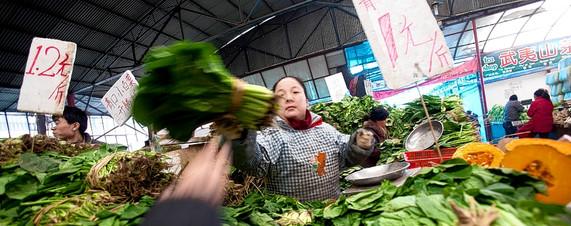Official Worries About Rising Prices Will Push Policy Makers to Allow Chinese Currency to Rise, Some Economists Say

Food prices have surged in China above, a Beijing market but government hasn't yet allowed the currency to rise as it seeks to contain inflation.
BEIJING In the complicated cocktail of policies China has pursued in recent weeks to tackle an unwanted burst of inflation, one ingredient has been missing: a stronger yuan. But economists think that is likely to change.
In the past two weeks, the Chinese yuan has barely budged against the U.S. dollar, though it is still up 2.4% this year. The tightly controlled currency is actually slightly weaker than it was on Nov. 11, when official data was published showing China's consumer-price inflation at a two-year high of 4.4%, with food prices surging 10.1%.
With inflation already sparking public discontent, the government has been working overtime since then to contain price pressures. While currency policy remains contentious, some observers think the renewed worries about inflation could help shift the balance of debate among policy makers and lead to renewed gains.
"In the current situation, with inflationary pressures rising, there may be more people who would support an appropriate appreciation of the renminbi," said Zhang Yongjun, an economist with the China Center for International Economic Exchanges, a prominent think tank in Beijing.
U.S. criticism of China's exchange-rate policy has continued in recent weeks. Federal Reserve Chairman Ben Bernanke weighed in during a speech this month, warning that a "strategy of currency undervaluation" in China and other emerging markets is preventing more-balanced global growth. But the yuan has risen at an annualized rate of more than 6% against the dollar since it was effectively unshackled from the U.S. currency in June, with gains often followed by interludes of a stable or declining exchange rate.
That is roughly the same rate as in the previous period of yuan appreciation from 2005 to 2008, which U.S. officials have pointed to as a model for acceptable upward movement by the yuan. Most economists expect the currency to resume that upward march against the dollar in coming weeks, though few forecast big moves.
There are also noneconomic factors that could drive China toward continued gains in the currency, notably, the planned state visit by President Hu Jintao to the U.S. in January, the first by a Chinese leader in a decade. "In the months immediately ahead, there could be another round of relatively fast renminbi appreciation against the U.S. dollar" to ease political tensions, said Morgan Stanley economist Wang Qing.
The pickup in inflation is hurting those with lower incomes, a source of concern for the Chinese government. "The price of everything, including food, vegetables and fruits, really scares me," said Li Guifang, a retired elevator attendant in Beijing. She says the price of eggs at her local market has jumped 20%, and that she is cutting back on luxuries to compensate. "My monthly pension of 2,000 yuan almost does not cover my living costs."
While a stronger yuan wouldn't be a cure-all for the recent rise in food prices, it could help lower the bill for China's huge imports of commodities, including iron ore, soybeans and crude oil. A higher exchange rate should also reduce the trade surplus, which would slow economic growth and thus also reduce broader inflationary pressures.
Still, exchange-rate policy hasn't been the central player in the anti-inflation policy that has been rolled out in recent weeks: The central bank has raised reserve requirements for banks twice already in November, forcing them to hold more cash and lend less. More mundanely, trucks carrying fresh produce are to be exempted from road tolls. Fertilizer exports are to be limited to insure sufficient domestic supplies. Local agencies across the nation are on the lookout for signs of hoarding and price gouging.
That multipronged approach, going after both the supply and demand sides of the economy, isn't unusual for Chinese policy making. "I think we should treat both the symptoms and the root causes," Xia Bin, an adviser to the central bank, said this month, endorsing both "somewhat tighter" monetary policy and "temporary administrative controls" to deal with inflation.
Government officials have made few public comments about the currency in recent weeks, even after Mr. Bernanke's criticism in a speech two weeks ago. Of course, few governments telegraph their currency moves in advance. And exchange-rate policy is a sensitive political issue in China, with many Chinese reluctant to be seen bowing to pressure for a stronger currency from the U.S. and the International Monetary Fund.
There is, however, a clear precedent: The yuan's appreciation accelerated in early 2008, when global commodity prices were surging and domestic inflation was also high. This year, the pickup in global agricultural prices since July has been more modest than in 2008 and so has the movement in China's currency.
China's currency policy remains a balancing act. There is continued resistance from China's exporters, many of whom fear a stronger currency will hurt their sales. Chinese officials have also been spooked by the Federal Reserve's latest attempt to lower interest rates by buying bonds, which they fear will lead to a flood of capital into China, adding to inflationary pressures. They don't want to encourage investors further by making the currency an easy bet.
"In a situation where expectations of renminbi appreciation continue strengthening, international liquidity will continue to flow in, adding to upward pressures on prices of goods and assets and making liquidity management more difficult," Hu Xiaolian, deputy central bank governor, said in a speech last week.





